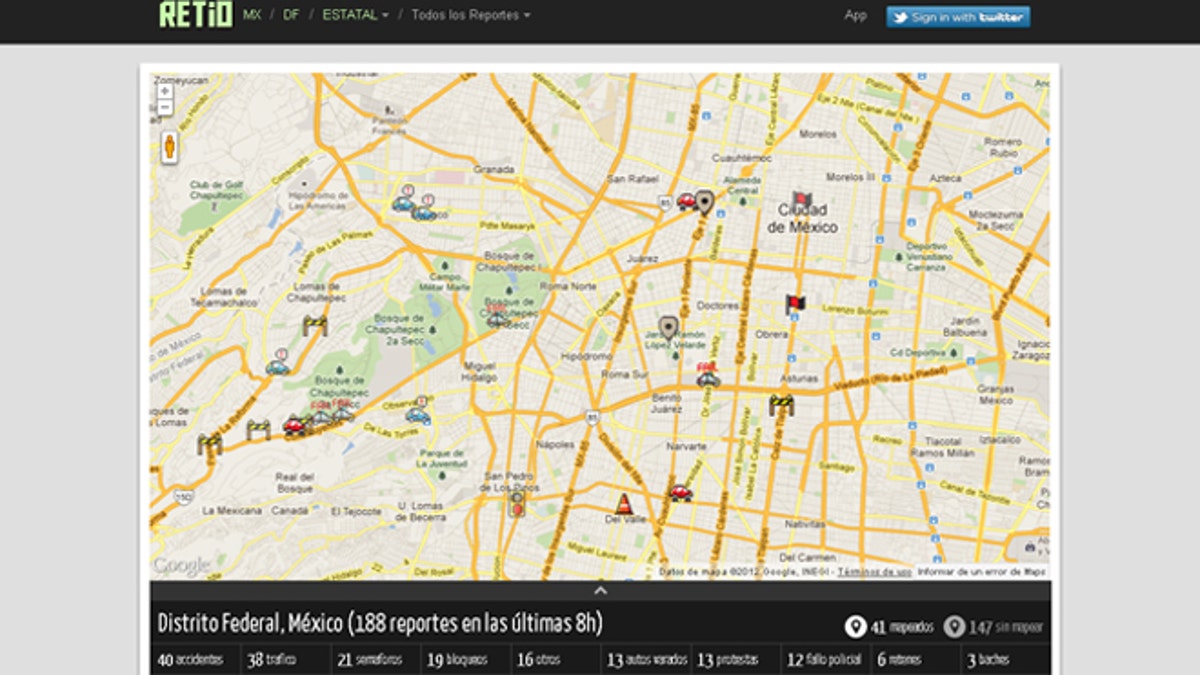
Mexicans now have a new tool to fight organized crime, corruption, theft and even traffic jams. It's called social media.
In 2011 Mario Romero and José Antonio Bolio, two twenty-somethings from Mérida in the Mexican state of Yucatán, created Retio, an app that works with iPhones and iPads in which Twitter users can upload photos and report anything from murder and corruption to roadblocks.
“The original goal was to organize and optimize Twitter to avoid different problematic situations that people face every day in Mexican cities,” Romero said, according to the Texas Observer. “Users in different cities started using hashtags to inform themselves of these type of situations, but it wasn’t an ideal solution – our plan was to build a better tool to resolve this and we’ve been able to do that. But we’re still not done.”
Contributors to Retio use the Twitter handle that corresponds with the city they are in (i.e. @RetioMID for Mérida) and then tweet out a description of the problem and, at times, an accompanying photo. Retio’s system then logs the information, deletes any spam and retweets it via the site’s own feed.
The system forces an instant transparency as far as attention to citizens, and that’s something they’re not used to yet.
Users can search the map on Retio to view what has been reported or narrow results down to specific incidents. People can also map each others’ entries as posts normally feature cross streets. Retio’s Twitter feeds are available in multiple cities throughout every Mexican state and the creators hope to bring it to other countries as well.
While the app has taken off in Mexico City, Mérida and Monterrey, some other towns have not picked up on the action. For example, the violent border city of Ciudad Juárez had only 15 followers and four tweets by Tuesday afternoon.
“We’ve seen the same pattern repeated in several cities,” Romero said. “Few users at first, but an accelerating growth as more users join when a ‘viral’ effect is produced.”
There are worries that the lack anonymity on the site could lead to retaliation from drug cartels and even Mexican law enforcement. Unlike its relative, Blod de Narco, Retio’s founders are very visible and user’s Twitter information is readily available.
“If Retio was to progress to providing more detailed information on gang activity it could bring users unwanted attention from criminals,” wrote Edward Fox of Insight Crime, a security website covering Latin America. “The potential for gang retaliation against citizens who use social media to expose criminal actions was demonstrated by the brutal killings of four people in Nuevo Laredo last year, who the Zetas claimed had posted information about the gang online.”
When speaking to the Texas Observer, Romero said that neither he nor any of the users have yet received any threats. He added, however, that municipal authorities and police officers are not happy about having to fix many of the menial tasks that have been reported.
“The system forces an instant transparency as far as attention to citizens, and that’s something they’re not used to yet,” he said. “As far as the criminals, especially narcos, I think they would probably be more worried about other types of reports, like journalistic investigations that expose them and their connections, than about citizens alerting each other about shootings and risky situations.”
Follow us on twitter.com/foxnewslatino
Like us at facebook.com/foxnewslatino
